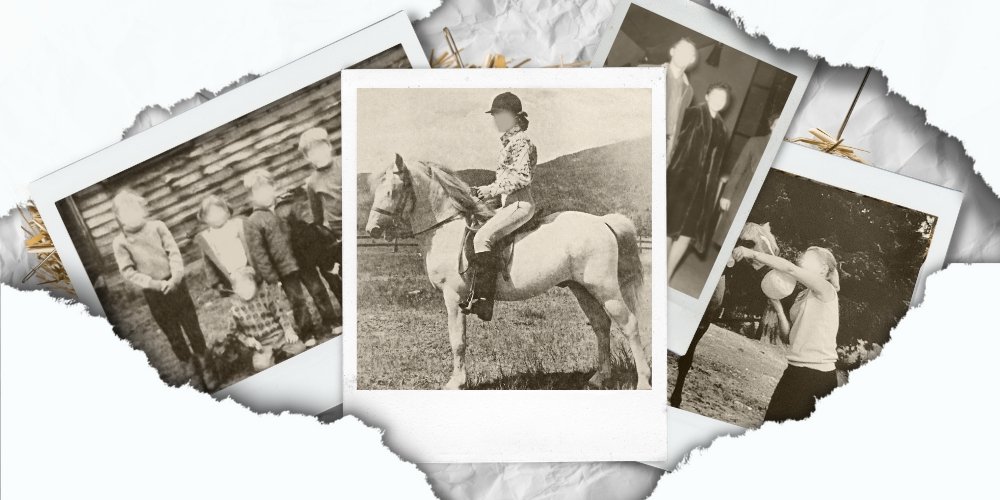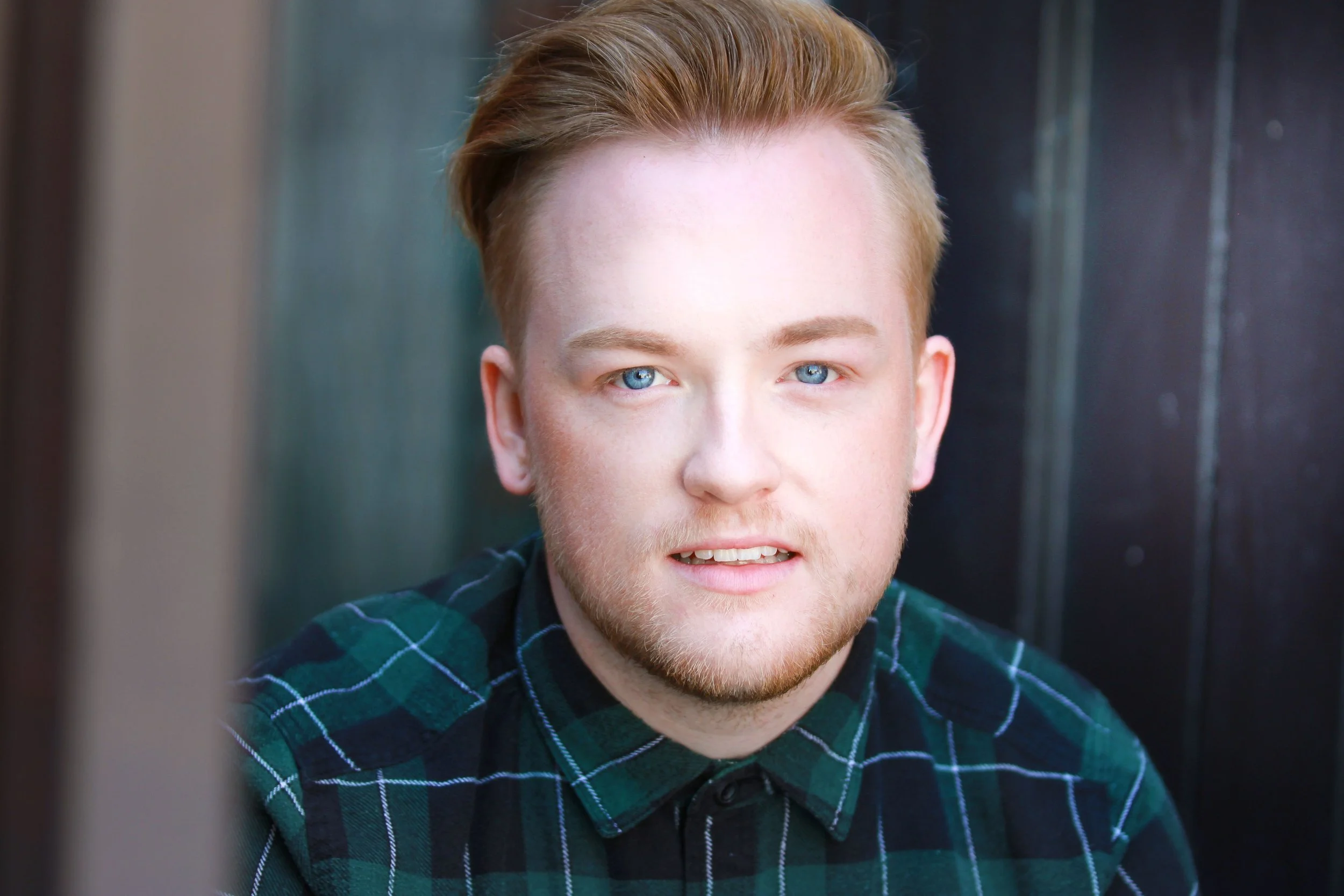Stir Q&A: Playwright Jarred Stephen Meek digs into painful family history for A Life Sentence
Vancouver Fringe Festival play draws on his mother’s abuse by her father, and explores ideas of justice and healing
A collage of images drawn from the playwright’s mother’s childhood in A Life Sentence.
A Life Sentence is at Arts Umbrella on September 7, 9, 13, 14, 15, and 17 as part of the Vancouver Fringe Festival
THE NEW FRINGE PLAY A Life Sentence has been a years-long journey for Vancouver’s Jarred Stephen Meek—one that, technically, stretches back to childhood.
The playwright, actor, singer, and drag artist graduated from Studio 58 in 2018. Based on the true story of his mother’s traumatic childhood, and her reckoning with it in adulthood, A Life Sentence took three years to research and write. Digging into such a personal and painful past wasn’t easy, though along the way, he had dramaturgical help from Vancouver theatre veterans Amiel Gladstone and Aaron Bushkowsky. The play was finally ready for production at his alma mater as a part of Fourplay 2020: New Work by Excited Writers, but that gig—his first as a professional writer—was cancelled in March 2020 due to the pandemic.
The play might have sat in limbo for several more years, except that now a new cast of Studio 58 graduates spanning the years 2011 to 2022 have stepped up to bring the piece to the stage at the Vancouver Fringe Festival. Meek codirects with best friend Jessie Liang.
Stir caught up with the playwright to talk about A Life Sentence’s long journey, ideas around justice and healing, and the way he adapted his mother’s revelations for the stage.
How did you personally come to know your mother’s story, and when did you know you wanted to turn it into a play?
I had always been aware of the childhood my mother had as I was growing up, but I did not know the details and the full scope of how it affected her life until I began this process. Back during Christmas of 2017, my mother and I were watching the news when a story about an unsolved murder of a young girl from my mom’s hometown came on. She looked at me and said “I wouldn't be surprised if my Dad did that,” which turned into an evening of stories and questions to which I could only say “Your life could be a movie,” and my mom got up and dug out over 60 pages of statements and interrogation transcripts and said “Write it.”
What was the three-year process of researching, interviewing family members, and writing this piece like?
I began writing almost as soon as I got home from Christmas vacation in January 2018. Knowing that he was a master manipulator and narcissist, I started by reading the transcripts of my mom’s father, so I could get a sense of his version of the events before reading my mom's statements, which would surely carry more truth. Having never met the man, I don't see him as my grandfather, and reading the transcripts felt like I was meeting a character for the first time. I immediately got a sense of the Jekyll and Hyde nature that a shrink once used to describe him. If I hadn't known better, I might have almost believed or felt sorry for him at certain points. Until I read my mom’s statements.
I started by writing scenes based on the written statements my mother provided in 1989. I then shifted my focus to the transcripts, turning them into verbatim scenes and piecing them all together for a first draft. I spent countless hours on the phone with my mother, asking her questions, listening to her stories, and having some pretty hard conversations. I don't know if it's the fact that I am a queer person and having had faced so much adversity in that sense that I could empathize with her struggles, but something between us just clicked through this process. We ended up laughing more than crying while talking about some of the darkest moments of her life. As much as it has been illuminating for me to get a deeper understanding of my mother, I believe it has been just as healing for her to share her story, reflect and acknowledge how it still affects her, and continue to push forward with the life she created for herself.
Once selected for production at Studio 58 as a part of Fourplay 2020, I began dramaturgy work with Aaron Bushkowsky, and then further dramaturgy by my then director, Amiel Gladstone. Their brilliant minds helped shaped the script into the most effective story and I couldn't be more grateful for their support in getting A Life Sentence to where it is today.
In the resulting play, how do you navigate and balance the complex mix of intense personal trauma, court records, and a timeline that spans decades?
It was a delicate balance working with real stories, transcripts and the actual living subjects. Sometimes, the need to serve and tell the story best overrode the desire to stay true to some of the content. For myself, I was always willing to “kill my babies”, as they say in theatre, but there were also certain elements to my mother’s story that I was not willing to compromise on. These difficult conversations and bumps in the road often lead to the best results.
It was important that while this is a heavy piece, there is still an element of light and colour to it. Survivors are not just victims—they are well-rounded human beings that are capable of experiencing joy alongside their pain, and it is important to tell their full story. Throughout the play, we are able to get glimpses of the normalcy of Gwen's life and personality through her best friend Lisa, and through her love for her equestrianism. Through creative storytelling and theatrical devices, we are able to tackle these heavy subjects in a safe and somewhat digestible way. Through creative lighting and sound designs, you will get to see characters both in the present time—the ’80s—and in flashbacks—the ’70s.
Jarred Stephen Meek
It must have been crushing to have the show cancelled during the pandemic. How have you managed to resurrect it with the help of a large team of Studio 58 grads?
Saying that the cancellation of Fourplay 2020: New Work by Excited Writers was the biggest blow of my creative career is nothing short of a fact. My best friend and fellow graduate Jessie Liang was also selected with her play Surrender, and getting to return to Studio 58 as professional writers together, less than two years after we graduated, was a literal dream come true—something we did not ever imagine we would both get to do together. A week and a half from opening, we were unfortunately cancelled due to the oncoming COVID-19 Pandemic.
That fall, I organized a virtual reading with most of the original cast, and premiered it live on Youtube to a crowd of over 100 viewers. Since then, I have pitched the show to multiple theatre companies and festivals, but have had no luck. It became clear to me that post-pandemic, people were not looking to produce content of such a heavy nature, as well as with a cast of eight, which in a pandemic-effected theatre world was now considered massive.
It got to the point that I felt like A Life Sentence, a play that is so important to me and my family, might never get to see the light of day. While my aging grandmother was living in a care facility losing her memories to dementia, I discovered a short memoir she had written on a typewriter. Five copies were made and put in duotangs for her five children to hold onto and have a written account of some of the most fun and adventurous memories of their time living on various farms. I edited and published the book on Amazon, and gave a copy to my grandmother so that even when she's lost all her memories, she can read them back from her own point of view.
When Fringe applications opened up, I decided that this might be the only opportunity for A Life Sentence to get its life on stage—doing it myself. In February, less than a week before my name was drawn as one of the final lottery picks for Fringe 2023, my grandmother's five-year fight with dementia came to an end, and she passed away. In a series of events that I can only attribute to my new guardian angel, I received a grant and was chosen for Vancouver Fringe on the same day—one of the last names to be pulled no less.
Due to the heavy nature of the project, I wanted to surround myself with like-minded artists and friends that would ensure we still had fun while working on this type of content. Being that everyone has the same training, we all speak the same artistic language, which makes the collaboration process that much easier. Plus, we have all had to devise theatre through our training at Studio 58, so I knew these folks would be the perfect gang to work with in this capacity. “Can we do this instead?” versus “May I make an offer?” makes all the difference when in process, and given that myself and Jessie are newer directors, we welcomed that type of collaboration under the right circumstances, and I am grateful that Studio 58 instilled that professionalism and respect in all of us.
What do you hope others who may have gone through family trauma take away from A Life Sentence—and how does it speak to the #MeToo era?
If one person, whether that be a young person, or someone who may have sat with their experiences for decades, feels that this play takes a little weight off their shoulders, makes them feel seen, or ultimately inspires them to relieve themselves of anything they've been holding onto, that is what I would like to come of this. There very well could be victims, survivors, and even abusers in the audience. Perhaps seeing Gwen's story will inspire them to begin the journey of accepting, and maybe even telling their own.
One of the lines in the script that is directly verbatim from the interview in 1989, is where the character of John says "...the way things are going right now, you know, I mean, I watch Oprah Winfrey, and Donahue, and the news and, uh, read the newspaper and uh, it is certainly the thing to do right now, there's no question about it." When I read this line, I had a visceral reaction to how, 30 years later, the same sentiment was being echoed by the likes of Harvey Weinstein and Bill Cosby in the height of the #MeToo movement. There was no question that this story needed to be written and told. Alina Blackett, who plays Gwen, put it best: “This show is quite simply the answer to the question ‘Why make art?’”















